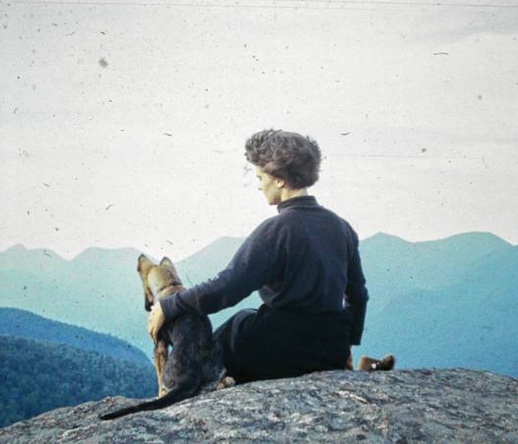A Yankee Notebook
NUMBER 1917
April 16, 2018
Bye, Bye, Sweetheart
Mother left us this past Thursday morning, a few minutes after ten. The nurses’ aides had just come in to flip her a few degrees. One murmured, “Uh-oh,” and hurried from the room. A nurse came in a few seconds later, put her stethoscope to Mother’s chest, and nodded. And just like that – it’s excruciating to remember, let alone write – she was gone. She’d been gasping, semi-conscious, her chest heaving, for two days. Suddenly she was still, and at rest. But none of the old nostrums about peace, freedom from pain and anxiety, being lifted in celestial arms, would do just then. She was gone, and she wasn’t coming back.

Ida Lange and their German shepherd, Hans, in 1959
The priest had been in a day earlier and, after oil of chrism and communion, had left his purple stole across her chest, presumably so that if the Devil showed up, he’d know right away that this lady was strictly off limits. One of our daughters picked it up and laid it across her open, unseeing eyes. What an awful moment! I’d kissed her goodbye probably thousands of times over the years, as I left early for work: kissed her cheek as she lay in bed, buried my face in the side of her neck, clasped her head in my hand on the other side. This was the last one. “Bye, bye, sweetheart. God, I’ll miss you!” I’ve been told the brain still fires for a bit after death, and that hearing is the last sense to go, so perhaps she heard me.
Unless you knew her, you can’t imagine her vitality! From the moment in July of 1959 that she walked, beautifully, past the manhole I was digging in State Street in Syracuse, till the last day of her life, we were inextricably engaged, truly for better or worse. All my life the people I’ve been most attracted to have been those most ready for adventure: for beginning an action you hope will lead to a desired result, but may not – like asking a woman to dance; entering a challenging rapid in a river far from home; starting a family because it’s time, not because your future is clear. Mother was the purest of adventure-seekers. In our very first brief conversation, after I’d chased her down the street and caught her at a post box, I heard in her voice the rising inflection that meant she was ready for almost anything.
I was a good, but unwise driver, yet she trusted me. My beat-up Jaguar roadster had a seatbelt only on my side, and the right-hand door (on her side) sometimes flew open on hard left bends. I remember her face, glimpsed once in a quick peek, as we took a hard left off a bridge over the Sacandaga River, late on a Friday night. Her door had swung open. She clutched my German Shepherd puppy in one arm, holding onto the sissy bar with the other, but showed not a scintilla of fear as the roar of the exhaust blasting in third gear followed us along the cliff that wanted us.
We married about twelve weeks after we met, and a month later moved to a barely furnished apartment in the Adirondacks. She hadn’t been much of an outdoors person. Now suddenly she was living on the edge of the woods with a space heater she never did master, an old radio that got two stations, a single bed that we slept in like spoons, and no transportation unless I was home from work.
She was an incredible blessing on my life. Because of a rugged, spotty childhood, she hadn’t expected much from adulthood, but pitched in to improve everything she could. She raised three great kids, who were with us when she died; she ran the Sunday School and Hospitality Committee at church; she joined Rotary and became Rotarian of the Year (a fellow member posted this week, “ I’ll always remember Ida’s wading in and taking control while others talked.”) She designed and we built five houses together; I’m sitting this evening in the last one. She started and for years ran a successful kitchen design business.
I dedicated one of my books to “Ida, the never-ending source of a million bright ideas.” If ever I was stuck for a topic the day of a deadline, and mentioned it, half a dozen came piling at me. Now, looking ahead, I appreciate the last line of Farley Mowatt’s lovely book about his dog Mutt: “From there, I turned to face the ever-darkening tunnel of the years.” I’m not much for an afterlife, but have a suspicion that she may not be far off. The lights may have gone out in that beautiful body, but its vitality lives on.
In a 2003 book about marriage, I made a prediction about this moment in our relationship. I don’t have a copy, so quote it from memory: “Canada geese mate for life. I will never in my life forget a pair I came across one evening beside a little river in the Canadian Arctic. The goose lay dying on the bank, and the old gander was trying to get her up. A little harlequin of an Arctic fox sat about fifty feet away, watching with great interest. Time and again the gander pushed his bill under his mate’s neck, lifting it; and each time it fell back onto the bank. Finally the old guy raised his head into the air and cried to the empty sky the full heart-rending agony of his breaking heart. I thought, ‘How terrible to be parted by death in this way. And yet how wonderful it must have been to have shared such a life and such a love.’” Still, having predicted it, there was no way I could have felt the depth of his pain till now. Bye, bye, sweetheart.


